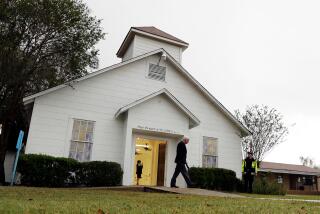Pastors Skirt Social Issues in Sermons, Study Finds : Preaching: Mainline Protestants favor religious themes. Other topics are often left to community programs instead of pulpit pronouncements.
- Share via
A recent nationwide study of sermons given by pastors of a mainline Protestant denomination found that ministers skirt potentially divisive topics--preaching on social justice issues only 5% of the time.
Religious themes such as faith, hope, forgiveness and reconciliation with God were central to 70% of the sermons. Another 11% of the pulpit messages pondered directions the church should take, said sociologist Joseph Faulkner of Pennsylvania State University.
The morally tangled subjects of marriage, divorce and sexual behavior received even less attention than social issues, accounting for 3% of the sermons, Faulkner said. Another 3% dealt with evangelism, a topic more dear to religiously conservative churches.
Faulkner’s analysis of the survey also indicated that even when dealing with strictly religious topics, the ministers were often too abstract to get their message across effectively.
The study examined sermons given during 1988 by ministers of the Christian Church (Disciples of Christ), a 1-million-member denomination regarded as liberal to moderate in religious and social stances. Most sermons analyzed came from pastors in the Midwest, Southwest and California.
Several Southern California ministers of that denomination, asked to comment on the findings, said they thought they preached a bit more than 5% of the time on social justice. They also indicated that their congregations’ involvement in community-action programs informs people about issues of social justice more than pulpit pronouncements.
But Faulkner said the national survey on the content of Sunday sermons--traditionally the 20-minute high point of Protestant services--indicated that contemporary issues played only “a minor part” in the preaching agenda of those clergy.
“By and large, even in passing, the pastors did not mention social justice issues or other problems,” he said of the survey, which he first presented at a conference of religious sociologists in October.
In the 206 sermons studied, for instance, the word “abortion” occurred only five times. Race relations were also rarely talked about, Faulkner said.
Women’s rights usually received favorable nods in passing, but only 8% of the sermons brought up feminist issues at all. Likewise, pastors referred to the national drug crisis in only 13% of the sermons, he said.
The ratio of social-justice sermons might seem surprisingly low, Faulkner said, except for the nearly identical percentage in a study made of San Francisco Bay Area churches in the socially turbulent, late 1960s. In that survey, sociologist Rodney Stark reported that “approximately 6% of the sermons . . . were mainly devoted to social and political topics.”
Expressing sympathy for the pastors, Faulkner acknowledged the difficulty of satisfying churchgoers who vary widely in age and political outlook. “They can walk out and never come back,” Faulkner said.
Even committed church members object to being preached at, church officials say. Touching on that reluctance, theologian Harvey Cox once said, “Sermons remain one of the last forms of public discourse where it is culturally forbidden to talk back.”
Some Southern California ministers affiliated with the Disciples, a popular shorthand name for the denomination studied, agreed that the sermon is a difficult place to raise tough issues.
“A lot of us make passing references to (many issues), which gets the point across and doesn’t alienate people,” said the Rev. Phillip McKinley of Alhambra First Christian Church. “But if you advertise beforehand that you are going to hit a (social ill), the people who don’t want to hear it just won’t show.”
The Rev. Peggy Owen Clark, Southern California executive for the Disciples, said her guess is “that ministers don’t preach more on social justice because that the church is less convincing when it talks about an issue than it is when it acts out a commitment to social justice.”
At Santa Monica First Christian Church--which has a basement shelter for the homeless and is engaged in various social ministries--the Rev. Charles Elswick said lay people object to the pastor who “abuses” his pulpit by “basically laying on his or her pet political or social point of view.”
Like many ministerial colleagues, Elswick builds each sermon from an ecumenical lectionary, which recommends biblical passages for each Sunday in the church calendar, but he said social implications can be drawn from most of Scripture.
The Rev. Robert W. Bock of North Hollywood Christian Church estimated that about 10% of his sermons deal with social justice issues and the figure probably rises to 25% when counting passing references. On issues where there might be wide disagreement, Bock said the best church forum is an adult education class, not a sermon.
Partly for that reason, neither Bock nor Pastor James W. Pierson of Wilshire Christian Church in Los Angeles preaches much on subjects as sensitive as marital and sexual relations, they said. “I don’t think I’ve talked about abortion in the last year,” Pierson added.
Pierson indicated that a social consciousness is infused at his church through specific references in sermons and church notices. Subjects of social conscience also come up when periodic fund-raising appeals are made for community assistance programs and through continued efforts to strengthen the Korean and Latino congregations meeting at the church. But rather than use the sermon to expound on current issues, “I feel I can be much more pointed on day-to-day issues in the pastoral prayer,” he said.
Faulkner, who directs the religious studies program at Penn State, said his aim is not to admonish clergy for avoiding touchy subjects but to find out what is being said from the pulpits of typical churches and whether they are effective presentations.
Faulkner asked randomly selected pastors of churches with more than 100 members to send copies of 10 consecutive sermons given in 1988 and 107 ministers, or 37%, responded. He randomly selected sermons to be analyzed. The sample was composed mostly of white, married, male pastors who were “veterans of the pulpit,” Faulkner said.
A Methodist who served two years in a pastorate himself, Faulkner said he knows of no comparable national study on sermon content.
On effectiveness, Faulkner gave many sermons poor grades:
- The bulk of the sermons described religious doctrines and beliefs abstractly, without sufficient explanation, he said. “Doctrinal sophistication on the part of any congregation is, of course, a dangerous assumption since biblical literacy among the general public is not great,” he said.
- Only about half of the sermons used personal illustrations--a much-recommended technique in preaching. But even then, about 25% of the illustrations were “utterly trivial and plainly irrelevant,” Faulkner said.
- Rather than drawing freely from all parts of the Bible, the pastors quoted the New Testament three times more than they did the Old Testament. When Old Testament passages provided the biblical base for a sermon, three of the 39 books--Isaiah, Jeremiah and the Psalms--were used half the time. Among the New Testament books, the four Gospels were most often cited, and the Gospel of John the most frequently used (37%), Faulkner said.
The sociologist suggested that the paucity of sermons on social and contemporary concerns may be linked to the limited use of Old Testament.
“There is little use of the great narrative stories and an almost total absence of the indignation at social injustice expressed by (early) prophets,” he said.
SERMON THEMES
A nationwide study of sermons by pastors of the Christian Church (Disciples of Christ) found that in 1988 less than 10% dealt with sensitive subjects such as social justice and marital/sexual relations.
THEME: PERCENT
Religious beliefs: 69
Future of the church: 11
Social justice: 5
Marital/sexual relations: 3
Evangelism/mission: 3
Biblical study: 2
Ministerial authority: 1
Miscellaneous topics: 6
More to Read
Sign up for Essential California
The most important California stories and recommendations in your inbox every morning.
You may occasionally receive promotional content from the Los Angeles Times.












